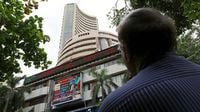The Indian stock market closed the last trading session of the fiscal year (FY25) on a negative note, with the benchmark indices Sensex and Nifty50 both recording losses. On Friday, March 28, 2025, the 30-share Sensex fell by 191.51 points, or 0.25%, to settle at 77,414.92. Similarly, the NSE Nifty50 ended down 72.60 points, or 0.31%, closing at 23,519.35. Broader market indices also reflected this downturn, with the Nifty Midcap100 and Nifty Smallcap100 indices closing lower by 0.32% and 0.15%, respectively.
Despite the losses on the final day of trading, both Sensex and Nifty50 wrapped up FY25 with gains of nearly 5% each. In contrast, the Nifty Midcap100 and Nifty Smallcap100 indices saw even more robust performance during the fiscal year, gaining 5.4% and 7.48%, respectively. However, the market's decline on Friday was evident across most sectors, with the Nifty IT index particularly suffering a setback, dropping 1.76% due to poor performances from major players like Wipro, LTIMindtree, HCL Tech, and Persistent Systems.
Market volatility was underscored by the India VIX, the fear index, which rose by 4.37% to settle at 12.72 points. The market will remain closed on Monday, March 31, 2025, in observance of Eid, with trading set to resume on Tuesday, April 1, 2025.
In terms of stock performance, the session saw eight stocks from the portfolios of renowned investors Mukul Mahavir Agrawal and Ashish Kacholia more than double in market value throughout FY25. Notable among these were companies like BSE Ltd, Neuland Laboratories, and Sarda Energy & Minerals, which saw increases of up to 267%. This starkly contrasted with the general performance of the Nifty 50, which only rose by 5.8% during the same period.
Meanwhile, the IPO market saw the closing of the subscription window for Indentixweb on the same day. The IPO was oversubscribed by nearly 1.09 times, with the retail investor portion being subscribed 1.86 times, although non-institutional investors showed a lack of interest, subscribing to only 88% of their reserved portion. The qualified institutional buyer segment saw no participation.
In other noteworthy developments, shares of Aster DM surged over 10% on Friday, reaching a high of ₹500.25 per share, nearing its 52-week high of ₹558.3. This rally was characterized by heavy trading volume, as 2.54 million shares exchanged hands, far exceeding the stock's two-week average of 23,000 shares. Conversely, the shares of Indian Overseas Bank (IOB) experienced a steep decline, hitting a 52-week low of ₹38.95 after falling 7% during the session.
In the broader context, global markets were also feeling the strain, particularly in the U.S., where stocks fell amid ongoing tariff uncertainties and fresh inflation data. The Dow Jones Industrial Average dropped 388 points, or 0.9%, while the S&P 500 and Nasdaq Composite fell by 1.1% and 1.5%, respectively. The core personal consumption expenditures price index indicated a 2.8% rise in February, raising concerns about persistent inflation, which could lead to recalibrated expectations regarding monetary policy adjustments.
President Donald Trump’s recent announcement of a 25% tariff on all cars not manufactured in the U.S. has further rattled investors, particularly affecting auto stocks and raising fears of an economic slowdown. The European Union is reportedly exploring possible concessions to mitigate the impact of these tariffs, which are set to be implemented starting April 2, 2025.
As the Indian markets closed, analysts were already speculating on the potential implications of U.S. tariffs on various sectors, including auto, pharmaceuticals, and manufacturing. Vinod Nair, head of research at Geojit Investments, noted that the current upward momentum in domestic markets had stalled as investors weighed the potential fallout from these tariffs.
Brokerage firm Jefferies reiterated its “buy” recommendation on shares of Oil & Natural Gas Corporation Ltd. (ONGC), reflecting confidence in the company's long-term prospects despite current market conditions. Additionally, the rupee strengthened to a three-month high, marking its most significant monthly gain in over six years, trading at 85.48 against the dollar.
Despite the overall market downturn, some stocks managed to stand out. For instance, brokerage firm Emkay Global upgraded shares of Maruti Suzuki India Ltd. to a ‘Buy’ rating, indicating a belief in the company’s potential despite a challenging near-term outlook for the passenger vehicle sector. Analysts are also optimistic about companies like Ramco Cements and Hindustan Unilever, recommending buy targets of ₹945 and ₹2,450, respectively.
As the fiscal year comes to a close, investors are left to ponder the implications of both domestic and international market dynamics. With the U.S. poised to implement new tariffs and inflation concerns looming large, the landscape for Indian equities remains uncertain. The upcoming trading sessions will likely reflect these challenges as investors adjust their strategies in response to evolving economic indicators.





